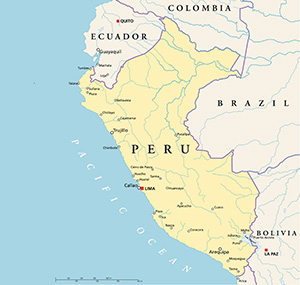Impact Evaluation of the Early Education Improvement Program in the areas of Ayacucho, Huancavelica, and Huánuco

Approximately 135,000 children between three and five years of age live in the departments of Ayacucho, Huancavelica, and Huánuco in Peru, where total poverty and illiteracy rates far exceed the national averages while students in primary school underperform in reading and mathematics.
Several studies in Latin America have found that preschool programs have positive impacts on children’s cognitive development and help to improve primary school attendance rates and test scores in language and mathematics. There is evidence that preschool programs positively impact the socio-emotional development of children in regards to behavioral skills, attention, and participation in class.
Project Details
AIR and its research partner from the Group for the Analysis of Development (GRADE) are using a mixed-methods quasi-experimental design to evaluate the impact of the preschool program named “Program to Improve Early Education in Ayacucho, Huancavelica, and Huánuco.” The main objectives of the program are to improve the quality of early childhood services for children aged three to five years in order to positively influence childhood development; provide adequate and safe learning spaces for children to facilitate the teaching-learning process; and improve teaching and management practices of educators through support, relevant educational materials, and participation of families.
Baseline data collection took place before the start of the preschool program in 2013, and included interviews with teachers, classroom observations, household surveys, and direct child assessment. This data was used to establish baseline measurements of outcome indicators and record relevant information on the characteristics of schools, classrooms, teachers, students, and families. Data were also collected from a comparison group of schools outside of the intervention area, identified using propensity score matching. The baseline results show that the treatment and comparison groups were very similar at the start of the evaluation.
The results from the baseline study also reinforced the need for an intervention to improve early education in the regions sampled. The results demonstrated that only around 10% of the preschools evaluated had adequate infrastructure (construction materials and access to basic services); and less than 30% of evaluated classrooms had adequate conditions (ventilation and adequate lighting). The results of the classroom observation showed that only 50% of teachers stimulated all four recommended areas of development (cognitive, fine motor, gross motor and socio- emotional). A similar proportion of teachers properly interacted with children in the classroom. Only half of all teachers reported having the proper printed materials to facilitate games or activities required by the Ministry of Education in Peru. Less than a third of parents attended meetings or activities organized by the school, reviewed the work of their children, or encouraged learning at home. Furthermore, there was a high percentage of parents that left children home alone for over an hour, especially in the rural areas.
The midline study will begin in April 2016 with the goal of estimating the impact of the Program to Improve Early Education in Ayacucho, Huancavelica and Huánuco after two years of implementation. GRADE and AIR will work together to generate knowledge of the program's impact on child development and primary school enrollment rates, the level of implementation of the program, and opportunities to improve implementation and impact of the program.